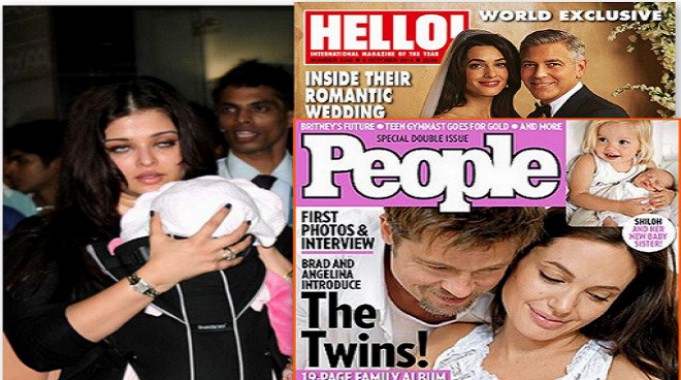Celebrity events: slim pickings
There are celebrities and then there are celebrities. Open Page 3 of the Delhi Times or the Bombay Times on any day and you would be likely come across the nuptials of the son of an industrialist or the daughter of a politician. This breed of famous people is generally more than happy to let the media into their ceremonies. If nothing else, it makes for some nifty promotion on the side.
Then there is the Bollywood star, the likes of Shahid Kapoor and Aishwarya Rai, who could not care less about media requests into their most cherished moments. The media to them is at best a headache to be indulged when a film is around the corner. Give long interviews to multiple publications and TV channels, appear on a few reality shows, spout sweet-nothings to contestants etc. All that is par for the course.
But come wedding or baby or anything even remotely personal, stars in India go into their shells, unwilling to share.
As stars take greater precautions in opening up to the media, interest in their private lives has only increased. The kind of interest in celebrity nuptials that we witness today can be traced to the wedding of Aishwarya Rai and Abhishek Bachchan in 2007 when the media went berserk trying to get a glimpse of the event.
They had to rely on pictures shared by guests who attended the wedding, since the event itself was barred to the media. From then to now, celebrity nuptials have become the one beat where the media’s famed influence counts for little.
Actor Shahid Kapoor got married this week to Mira Rajput at a hotel in Gurgaon, and the mainstream media, at least the Page 3 supplements, went ballistic in their effort to cover the wedding. From pictures of the wedding invitation to details of the ceremony, everything that could be laid hands on was shared with a (supposedly) curious readership.
The only hitch: there was no information forthcoming from the family itself. So what we had was a repeat of the coverage of last year’s wedding of Salman Khan’s sister Arpita Khan where, again, the media went overboard in trying to glean information from a couldn’t-care-less setup.
Purists would say that if Kapoor was interested in sharing the details of his wedding, he would do so, and we would all know. Why, they sneer, do we need to know stuff like how old Rajput is, or that she and Kapoor met at the Radha Soami Satsang Beas? To them, this level of interest is highly objectionable, bordering on prurience.
I don’t think it is. Celebrity lives are a matter of public interest in every country, not just ours, and if the coverage does not tip into the intrusive, there is no reason for a gag. Besides, film stars make for great copy and add much needed spice to the rather dour real estate of a newspaper.
The question, then, is not why the media is so taken with the private lives of our actors. The question is why the media has not devised a workable method for gaining information about such events. The only original pictures of the wedding that appeared in the mainstream media were of his family arriving at the venue. For the real deal, the media had to rely on anonymous guests to share details.
There is always someone, if not the protagonists or their families themselves, who is willing to go to town with pictures. But the spread of social media has ensured that no one media house can claim exclusivity over the pictures.
Then there is the fact that the media landscape itself has changed dramatically, so that stars can now share details of their lives directly with the audience. Kapoor, in fact, Instagrammed pictures from his wedding which his legions of followers on the app lapped up eagerly.
The mainstream media repeated these pictures in its pages. In this respect, it has become social media’s second cousin and is increasingly being sidelined on celebrity reportage.
There is another issue at play. The media setup in India has still not reached a stage where it can strike deals with celebrities to gain exclusive coverage of, say, their weddings - a common practice in the West. Foreign celebrities routinely sell pictures of their nuptials to the highest bidder. Pictures of George Clooney’s wedding to Amal Alamuddin in Venice last year were sold to People magazine in the US and HELLO! in Europe for a positively stratospheric, though undisclosed, sum.
Back in 2008, People and HELLO! signed a $15 million deal for the exclusive rights to the first photos of Angelina Jolie and Brad Pitt's twins, Knox Leon and Vivienne Marcheline.
Perhaps the Indian ethos which lays great store by the sanctity of marriage and family would not permit celebrities to sign such deals. While that is understandable, why they should choose not to allow even a small media contingent into their midst defies logic.
And so, we have the curious instance of fantastic interest in celebrity weddings on the one hand, and only scraps of information available in the mainstream media on the other.







